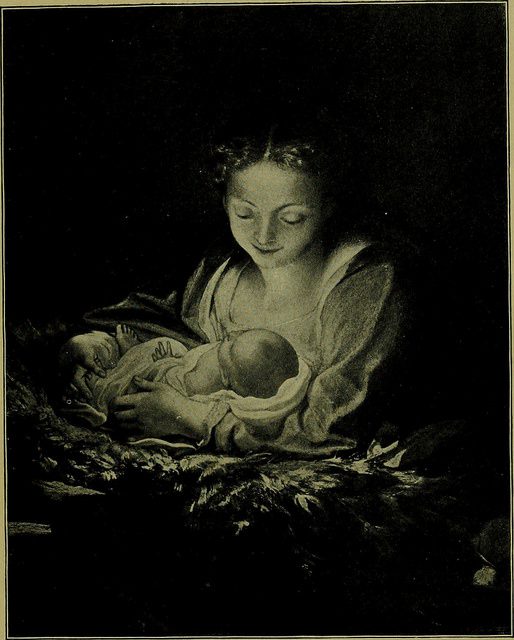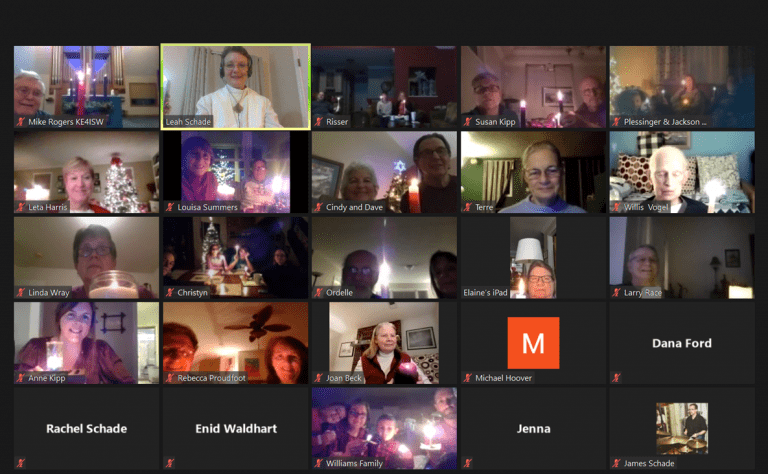They say a picture is worth a thousand words. But when we hear the Christmas story from the Gospel of Luke, it’s more like: a word is worth a thousand pictures. Just think of all the Christmas cards you’ve received over the years with all the hundreds of artistic renditions of the Nativity through the centuries. They give us visions of the perfect Christmas artistically portrayed in every imaginable hue. Every year, our family receives a flurry of cards with a myriad of these different images.
We hang these beautiful cards on the wall, creating a mosaic of the perfect Christmas.
One scene we often see is a romantic, air-brushed image of Joseph and the round-bellied Mary on the desert road with the pretty silhouette of Bethlehem in the distance. But it may not have been as perfect as we’d like to imagine.

When I was 7 or 8 months pregnant, if the government had told my husband and me that we had to make a trip back to his hometown to pay our taxes, you can bet that I would have been a little upset.
And to make that journey riding a donkey? I can only imagine how distressing that must have been. Not only would she have had terrible trouble trying to get comfortable on the back of this less-than-smooth-riding animal. They would have had to stop about every 45 minutes for her to go to the bathroom!
Then they finally get to Bethlehem. They can’t find any place to stay except a barn where Mary has to give birth.
I’ve tried to imagine how it might have been for Mary to give birth in that stable.
This was certainly not the ideal birthing place. When I gave birth, I was at a birth center. I was in a pleasant, warm room painted in soft pastels with a clean bed. My husband and important family members were there, including trained professionals, to support and encourage me as I went through the birthing process for the first time.
Mary did not have such a place. That stable might have been warm enough for animals, but it was probably drafty, and certainly not the most sanitary place. And to have to smell all those barn animals while trying to give birth? Certainly, not ideal.
In those days, it was customary for the primary females in a woman’s life to be with her when she gave birth. They would have gathered around the woman in labor to support her, encourage her, share with her all their accumulated wisdom of birthing. They would massage her, make her tea, talk to her, comfort her, and have their hands ready to receive the baby as it emerged.
Mary would not have had the benefit of this sacred gathering of women.
How difficult, how lonely and frightening it must have been for her. This young woman was giving birth for the first time with no mother, no sister, no aunt, maybe not even a midwife to help her through this labor.
And while it’s perfectly acceptable and even expected that the father is present and supportive during the birthing process today, for Joseph, this would have been extremely challenging. No Lamaze training for him! No idea what to do with this woman pushing as hard as she could to bring this baby into the world. And given the high mortality rate during labor in those ancient times, it’s a wonder that both Mary and the baby even survived the ordeal with their lives.

Correggio (1489 – 1534). Public domain
They don’t make pretty Christmas cards out of this scene, do they?
In our greeting cards, Mary doesn’t look like she’s just given birth. She looks like a perfectly-composed, white-skinned, model-thin actress instead of a disheveled, exhausted, olive-skinned woman who just went through hours of difficult labor. All we get is the cleaned-up picture afterward, with Mary and Joseph kneeling peacefully and reverently at the manger.
Against this perfect-Nativity backdrop, we have all the secular perfect-Christmas-propaganda.
It’s pumped out by radio stations, television specials, movies, and advertisements designed to sell us an ideal that ephemeral at best, unattainable at worst. Every year we hope and prepare for the perfect Christmas. But sometimes there can be a feeling of let-down when things don’t happen the way they’re supposed to. Ironically, it’s when we hope to be the most happy that we most acutely feel the sadness.
Maybe this is because we put Christmas on a pedestal and worship it, almost like an idol.
And when our own efforts to live up to the image and ideal of this perfect Christmas let us down, we can end up feeling depressed and frustrated.
The problem with all these pretty pictures of the perfect Christmas is that they create an idealized image that is not at all what the first Christmas was like. And this distortion is not at all helpful to our faith. Because it’s unrealistic, untrue, and unfair to the story itself.
This year, maybe it’s time to be truthful about the imperfectness of Christmas.
Maybe we can relate to the emotions that Mary and Joseph might have been feeling. Like them, we are often called to take on tasks by powers beyond ourselves who are quite unreasonable in their requirements of us. We find that the world is rarely sympathetic to our personal circumstances.
Some have to work on Christmas, including essential workers who are often underpaid, overworked, and under-protected. As well as health care workers who are at the end of their physical limits trying to care for coronavirus patients.
Many people are facing evictions and financial ruin due to the pandemic. Also because those in power refuse to fairly distribute the wealth of this country to help its poorest, low-wage and middle-class citizens.
All of us have come through a year that has exhausted us with political upheaval, environmental disasters, and social unrest. Not to mention our black and brown siblings who are living with trauma upon trauma, continually targeted with police brutality. They endure systemic racism every day along with the psychological stress of white fragility, white privilege, and outright white supremacy.
Even the church has been affected.
The virus doesn’t care that this is Christmas Eve and that we want to be together with each other. We want to shake hands, hug, lift our candles together to sing “Silent Night” in a cozy sanctuary decorated with greenery. Instead, we are at home connected only by the glowing light of our screens. We miss each other. We miss our friends and families. And we miss the people who have died. Or we worry about those who are sick and may not make it.
So it’s difficult to feel peace and joy when we’re in the midst of all this. We’re isolated, lonely, and separated from the ones we love. Just like Mary and Joseph.
If Mary and Joseph had been at home in Nazareth and had given birth in those familiar circumstances, the first ones to visit the baby would have been family and close friends. But there in Bethlehem, far removed from the familiar faces of home, it must have been felt so isolating. There they were, sitting in a barn full of smelly animals, trying to nurse a baby, exhausted from the labor.
Then at some point during the night, the door creaks open, and faces appear in the moonlight. Not family, not friends. Strangers. And not just any strangers — shepherds.
Again, we have a romanticized vision of these robed figures standing around the manger adoring the newborn child. Mary and Joseph look on with placid, approving smiles on their faces. But shepherds were like the equivalent of migrant workers today – outcasts who were disparaged by society. Mary might have been hesitant about these shepherds at first, and understandably so.
“Joseph, why are these shepherds here gawking at my child? Get them out of here!”
I can imagine Mary’s tears of exhaustion and frustration.
“This is not the way it was supposed to be. We were supposed to be home, with our family, surrounded by love and joy. And here we are in some God-forsaken little backwater town. We couldn’t even get a room with a bed! I had to give birth to this baby alone in this smelly barn. And now these smelly, dirty shepherds want to come in here and look at my baby? We just got him to quiet down and sleep here in the manger, and they want to see Jesus?”
“Jesus? Is that what you’ve named him?” one of the shepherds might have asked.
“We were told by . . . I guess they were angels . . . that this baby would be here. We were on the hillside with the sheep, and these strange beings just appeared in the sky. There was beautiful music that we’ve never heard before. And they gave us a message. Told us we would find a baby wrapped up in cloth and lying in a manger. ‘He is the Messiah,’ they said, ‘the savior, the Lord.’ And here he is!”
Suddenly, Mary remembers.
Nine months ago, she was in her room, alone, and this strange being just appeared before her, gave her a message. Told her she would give birth to a son. “You will call him Jesus, the Son of the Most High, the Lord God.” And here he is! Then Mary treasured all these things and pondered them in her heart.
It was not the perfect Christmas. This was not the way things were supposed to be. But Jesus still came anyway – right in the midst of it all.
We are not having the perfect Christmas, either, are we? Sometime during this Advent and Christmas season you’ve probably said these words: this is not the way things were supposed to be.
You might feel a hollow pain when you see that empty chair at the table where your loved one would have been. Your heart will sink and you’ll say, this is not the way it was supposed to be.
And yet somehow, in the midst of this imperfection, Jesus still comes to us. God still finds a way into our lives. Christ still comes into our midst.
Now that is something to ponder in our hearts!
Christ comes to us in so many ways. In the people who are caring for those stricken with Covid. Through those who are working for justice in our communities. And right here in the midst of our worship.

Christ comes into our gathering here tonight around the Word and Sacrament — in the sharing of bread and wine at Holy Communion. Christ connects us, even through these screens. Even with the ones who are not with us.
Maybe we don’t have to be perfect after all. In fact, maybe it’s better not to try to be perfect.
Because the Messiah will not wait until everything in our lives is the way we want it to be. The baby will not be put on hold while you get your life in order, clean up your act, get everything into place the way you want it.
When those contractions start, that baby is coming, ready or not. Christ does not wait for our convenience, but comes into the midst of our lives, however imperfect we are, and meets us there. Jesus meets us with perfect love.
That newborn baby doesn’t worry about things being perfect. All that baby wants is to be held and fed; to be touched softly and loved completely.
Perhaps this is the perfect Christmas for an imperfect time.
We just need to be there, with our arms outstretched, ready to receive that baby, ready to receive the Christ child. Amen.
Read also:
Magnificat: Mary and the Refusal to be Small for Insecure, Fearful Men
Joseph and Jesus: Honoring the Non-traditional Parent
And on Earth – Peace: A Christmas Eve Ecological Reflection

The Rev. Dr. Leah D. Schade is the Assistant Professor of Preaching and Worship at Lexington Theological Seminary in Kentucky and ordained in the ELCA. Dr. Schade does not speak for LTS or the ELCA; her opinions are her own. She is the author of Preaching in the Purple Zone: Ministry in the Red-Blue Divide (Rowman & Littlefield, 2019) and Creation-Crisis Preaching: Ecology, Theology, and the Pulpit (Chalice Press, 2015). She is the co-editor of Rooted and Rising: Voices of Courage in a Time of Climate Crisis (Rowman & Littlefield, 2019). Her latest book, co-written with Jerry Sumney is Apocalypse When?: A Guide to Interpreting and Preaching Apocalyptic Texts (Wipf & Stock, 2020).
Leah is also co-founder of the Clergy Emergency League, a grassroots network of clergy that provides support, accountability, resources, and networking for clergy to prophetically minister in their congregations and the public square in this time of political upheaval, social unrest, and partisan division.
Twitter: @LeahSchade
Facebook: https://www.facebook.com/LeahDSchade/













